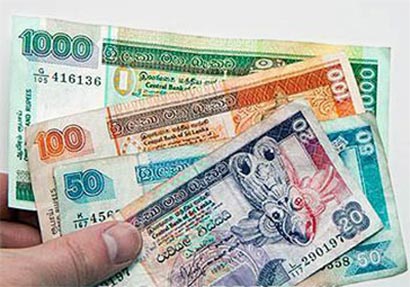Sri Lanka rupee hits record low

COLOMBO: Sri Lanka’s rupee on Tuesday tumbled to a record low against the US dollar on investor worry about the country’s massive external trade deficit, economists said.
The rupee slipped to 123.00 to the dollar early in the day — its lowest level ever against the US unit, a central bank official said.
But intervention through a state-owned bank halted the rupee’s slide as the institution sold dollars and bought rupees to shore up the local currency.
“The state bank intervened and sold dollars,” a dealer, who could not be named, told AFP.
The intervention pushed the Sri Lankan currency up to 121.00 rupees against the US dollar by the close.
“The currency is under pressure because Sri Lanka is facing a very wide trade deficit that can’t be filled by foreign remittances,” said W. A. Wijewardene, economist and former deputy governor of the Central Bank of Sri Lanka.
“There is voracious demand in the foreign currency markets for dollars from importers, putting pressure on the rupee.”
Imports have surged with Sri Lanka’s economy emerging from decades of ethnic strife after the crushing of Tamil Tiger separatist rebels in 2009.
Analysts say Sri Lanka is facing a balance of payments crisis with the trade deficit ballooning to a record $9.74 billion in 2011, nearly double a deficit of $5.2 billion in 2010.
The Central Bank of Sri Lanka earlier in the month stopped intervening in the market, and has allowed the rupee to shed nearly eight percent of its value against the dollar.
The intervention on Tuesday was in apparent breech of this new policy.
The bank spent $2.7 billion defending the rupee between last July and February.
The island devalued its currency by three percent in November in a bid to remain competitive and boost exports. Despite the move, demand for Sri Lanka’s exports has weakened in the face of the European debt crisis.
The island’s deficit totalled just $3.12 billion in 2009 when Sri Lanka faced a serious foreign reserves crisis and was forced to seek a $2.60 billion bailout from the International Monetary Fund (IMF).
Source: AFP
Latest Headlines in Sri Lanka
- Sri Lankan President pushes for rapid digital economy growth February 22, 2025
- Namal Rajapaksa ready to lead if government dissolves February 22, 2025
- Two suspects in Kotahena shooting killed in Police shootout February 22, 2025
- One killed in Kotahena shooting – Suspects arrested while fleeing February 21, 2025
- Sri Lanka’s inflation drops further to -4.0% in January 2025 February 21, 2025



ND,
What is your expert opinion on this news item when illiterates, dumbs and gansters run the country. Coruption is the name of the game right from the top and lawlessness prevails.
Mind this’s a result of our “Lawfullness” against evil westerns.
Ex Chief Justice recently said Lanka has lost Rs 100 billion due to bribary, corruption and mismanagement over the last year.
Dr Harsha DeSilva ( economist) had said Lanka lost Rs 890 billion between ’05-09 due to above.
Lanka’s wealth is being swallowed by the leadership and the gang of thieves as well as the extended family.Now let the poor pay the price !!!!!
At last, rational Sri Lankans are realising the current regime’s “pulling wool over the eyess” approach to governance.
What the rulers are after is the national welath and not the national well-being.
Anil..
It may be true but accusing govt is not good enough. Because we’ve no other choice. so must agree to this govt in keeping at least on this level.
Sorry, the govt. needs to be accused absolutely. There has been Zero effort to stop this calamity because all the culprits are they themselves!!. It is the same absolute stupidity that wanted to have commonwealth games in their family village just to prop up ego spending Rs 500 billion !!!! Lanka was saved from this calamity !!
Mihin air lost -13.5 B, SL airlines lost 28 B, Rs 101 B loss from state coorerations last year, blasting of H’tota rock- Rs 4 B, Deyata Kirula Rs 21 B, Rs 14.5 B to import vehicles, Oil hedging loss- Rs 17 B etc etc.
And look….. no culprits for any of the calamities as most headed by relatives and henchman not professionals!!!!!
Anil and the other diaspora Tamils and their henchment are jumping for joy at higher exchange rate for Rupee currently. Don’t these buffoons ever learn, whole of Europe’s economy was affected by USA’s unilateral sanction on Iran. This has led to higher fuel costs, which in turn affects everything else due to increased transport costs and electricity etc. USA has done this deliberately and craftily to upset the world’s economy. Greece, Italy Spain, Portugal and Ireland are near bankrupt. They are being supported by IMI, World Bank. EU leaders had visited China, with cap in hand to beg for loans to help the EU countries. If not EU will break-up. As for blog 6, Anil is playing the usual numbers game, which does not impress any of us. Those bloggers who accuse the govt of corruption are merely throwing mud at the govt with little evidence. The ex-CJ was the most corrupt and evil man, who stole another man’s wife and found also in a tryst with a prostitute in a notorious area.